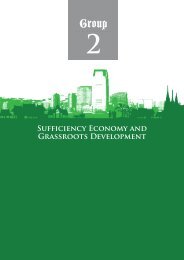Conflict, Legitimacy and Government Reform: Equitable Allocation of ...
Conflict, Legitimacy and Government Reform: Equitable Allocation of ...
Conflict, Legitimacy and Government Reform: Equitable Allocation of ...
Create successful ePaper yourself
Turn your PDF publications into a flip-book with our unique Google optimized e-Paper software.
Panel Discussion<br />
Even though this group <strong>of</strong> people seems powerful, in reality they are<br />
not that powerful after all because it is splintered into numerous small<br />
interest groups. More importantly, interest groups <strong>of</strong> these people have<br />
never been able to form their own organizations in order to actively study<br />
<strong>and</strong> push for policy implementation. Moreover, they have failed to reach<br />
out to the media that <strong>of</strong>fer policy alternatives. (For example, in many<br />
cases, reduction <strong>of</strong> pollution in production can reduce more production<br />
costs as well. So, the middle-class fear being out <strong>of</strong> job more than ruining<br />
their lungs because they never knew that work <strong>and</strong> healthy lung can coexist.)<br />
When the truth unfolds, these people have no power to influence<br />
public policies <strong>and</strong> they can neither develop a policy themselves nor<br />
participate in the formulation with promising results. The only thing<br />
they have left is clamor. If they blared loudly, they would get some<br />
attention but if they just complained quietly, they could vent their<br />
frustration because they could feel relieved after making some noise.<br />
The fifth way <strong>of</strong> how public policies are formed is through what<br />
politicians call “NGOs.” In reality, NGOs today are even more wimpy<br />
(especially when comparing to Jon Ungphakorn who chairs Kor.Por.<br />
Or.Phor.Chor.) because presently NGOs are acting like bureaucrats<br />
working in another department. Their main goal is to keep subsidized<br />
projects running more than anything in the whole world, let alone nasty<br />
fighting among themselves over shares <strong>of</strong> the pie.<br />
As for the group <strong>of</strong> people that actively engage in the formulation <strong>of</strong><br />
public policies, I’d like to call them “activists.” Some people or some<br />
groups may also be NGOs (like Archarn Jon mentioned above). These<br />
people do not have civic “bases” anywhere. Since they do not perform<br />
some sort <strong>of</strong> social welfare works like NGOs, they must create civic<br />
“bases” from the policies that they support by advocating these policies<br />
through the media by networking with activist groups in the civic sector<br />
(which are used to partially contribute to the formulation or<br />
modification <strong>of</strong> public policies supported by them) or directly joining the<br />
civic sector’s movements, provided that such movements correspond to<br />
their public policies.<br />
73














